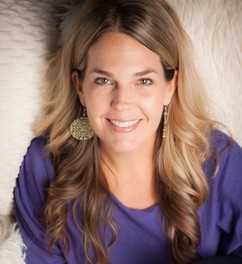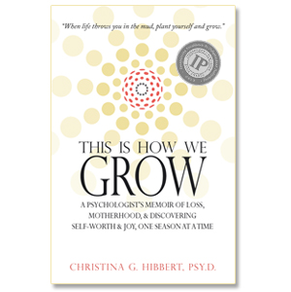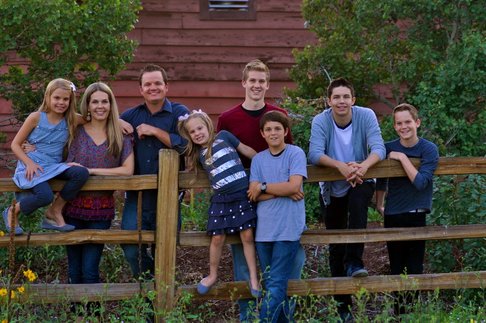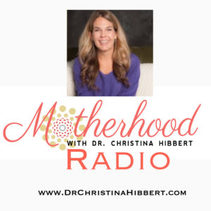MAY 2017 Featured Interview |
|
Interview with
Christina Hibbert, Psy.D.
Founder of AZ Postpartum Wellness Coalition &
Motherhood Radio/TV
About Christi:
Christina Hibbert, Psy.D., is a clinical psychologist who specializes in women’s mental health, postpartum depression, grief, motherhood, personal growth and parenting. She is the host and founder of Motherhood Radio/TV which provides education and insight to mothers on a variety of topics. Christi is the bestselling author of several books, including her memoir, This is How We Grow (Oracle Folio Books), which won an Independent Publisher’s Book Award. Christi is also a frequent keynote speaker and 30Second Mom contributor.
After a personal battle with postpartum depression, Christi realized that women and their families were in dire need of more resources and support. She is the founder and president of the Arizona Postpartum Wellness Coalition, which has recently partnered with Postpartum Support International (PSI). The coalition offers support for moms and families who seek resource information concerning women who are at risk of or are experiencing distress, anxiety, trauma and other difficulties during pregnancy or postpartum.
Christi lives with her husband and six children, ages 9 to 20, in Flagstaff, AZ.
Christina Hibbert, Psy.D., is a clinical psychologist who specializes in women’s mental health, postpartum depression, grief, motherhood, personal growth and parenting. She is the host and founder of Motherhood Radio/TV which provides education and insight to mothers on a variety of topics. Christi is the bestselling author of several books, including her memoir, This is How We Grow (Oracle Folio Books), which won an Independent Publisher’s Book Award. Christi is also a frequent keynote speaker and 30Second Mom contributor.
After a personal battle with postpartum depression, Christi realized that women and their families were in dire need of more resources and support. She is the founder and president of the Arizona Postpartum Wellness Coalition, which has recently partnered with Postpartum Support International (PSI). The coalition offers support for moms and families who seek resource information concerning women who are at risk of or are experiencing distress, anxiety, trauma and other difficulties during pregnancy or postpartum.
Christi lives with her husband and six children, ages 9 to 20, in Flagstaff, AZ.
Myrna Beth Haskell, managing editor, talked with Christi about postpartum depression and her decision to provide support and resources for other moms as well as what she finds both challenging and fulfilling about raising a large family.
What motivated you to start the Arizona Postpartum Wellness Coalition?
I personally suffered from postpartum depression. I was concerned about how I was feeling, so I called the doctor. His nurse told me that he said not to worry…that it was just “baby blues” and would go away. But it didn’t go away. It wasn’t just baby blues. I remember feeling embarrassed. I mean, this is a time when you want to feel at your best, and I felt at my worst. I was thinking there must be something wrong with me because I had this beautiful baby and should have been feeling elated, but, instead, I was feeling depressed. When I started graduate school, I had two very young children. I began sleeping on the floor at my parent’s house because I didn’t want anyone caring for the babies but me. Naturally, I became severely sleep deprived.
I had postpartum depression with all of my pregnancies, so I eventually knew what to do, and this helped tremendously. Even with doctoral training, there is no formal training on postpartum depression. It’s not studied in-depth. This fueled me to want to educate people. It’s so important to get help because this can negatively affect your feeling of self-worth. For those who get help, it can typically run its course in six to twelve months, but the condition can become chronic. For those women who don’t get help, it can turn into maternal depression. It can also extend beyond the mother to her partner. While in graduate school, I produced educational videos with Cynthia Lermond, Psy.D. We interviewed couples to get both the mother’s and father’s side of things.*
*Note: The Postpartum Couples DVD is a great resource for medical and mental health providers as well as for couples both before and after a birth. It was one of the first videos that addressed the needs of both the woman and her partner. It can be viewed for free online HERE.
I personally suffered from postpartum depression. I was concerned about how I was feeling, so I called the doctor. His nurse told me that he said not to worry…that it was just “baby blues” and would go away. But it didn’t go away. It wasn’t just baby blues. I remember feeling embarrassed. I mean, this is a time when you want to feel at your best, and I felt at my worst. I was thinking there must be something wrong with me because I had this beautiful baby and should have been feeling elated, but, instead, I was feeling depressed. When I started graduate school, I had two very young children. I began sleeping on the floor at my parent’s house because I didn’t want anyone caring for the babies but me. Naturally, I became severely sleep deprived.
I had postpartum depression with all of my pregnancies, so I eventually knew what to do, and this helped tremendously. Even with doctoral training, there is no formal training on postpartum depression. It’s not studied in-depth. This fueled me to want to educate people. It’s so important to get help because this can negatively affect your feeling of self-worth. For those who get help, it can typically run its course in six to twelve months, but the condition can become chronic. For those women who don’t get help, it can turn into maternal depression. It can also extend beyond the mother to her partner. While in graduate school, I produced educational videos with Cynthia Lermond, Psy.D. We interviewed couples to get both the mother’s and father’s side of things.*
*Note: The Postpartum Couples DVD is a great resource for medical and mental health providers as well as for couples both before and after a birth. It was one of the first videos that addressed the needs of both the woman and her partner. It can be viewed for free online HERE.
|
How did the coalition come to fruition?
In 2005, I started volunteering for PSI (Postpartum Support International) in California. They had a lot of resources. I wanted to start something in Arizona, so I invited a lot of people and held a forum in Phoenix. Thirty providers throughout the state came. My colleague and I then started the coalition and got non-profit status. We set up a “warm line,” not a full-time “hot line”* because we didn't have sufficient staff. Initially, my colleague and I took turns answering messages. We still have the warm line, but we are now part of PSI. We had always worked with them, but they now financially support us, and we give money back to them. *Note: Generally speaking, hotlines provide emergency support for people in crisis, but warm lines are there to provide support and a safe space for people to talk and learn about available resources before a situation reaches a crisis level. |
Please Click Below to View Important Information about the
Arizona Chapter of PSI: |
|
You help moms in all stages of motherhood. Tell me a bit about your Motherhood Radio/TV program.
I’ve experienced tremendous loss and grief. I lost my sister to an overdose, so I had to begin functioning as a mother of her two boys. Suddenly, I had six children. Then, a couple of years later, my dear friend committed suicide. My daughter was only ten, and she was traumatized by the death because my friend was like a second mom to my daughter. I needed to be there for my daughter and my entire family, so I had to put work aside. Then, WebTalk Radio approached me. I knew I couldn’t travel as I used to, and this presented an opportunity for me to reach others without being away from my family. I was also hoping to reach more mothers, and speaking is my favorite way to do that. I wanted to help women grow through motherhood. Mothers need to be motivated about personal growth more than anyone, since they tend to always take care of everyone else. I’ve had great guests, and have learned so much from top experts like Dr. Shefali Tsabary, who is a world-renowned clinical psychologist. I get great recommendations for topics and possible future guests from those I’ve already had on the show. It’s really a fun way for me to share. |
To Learn More About Christi's Book & To Purchase,
Click the Book Cover. |
*Note: Motherhood Radio/TV is a place where moms can hear discussion on the joys, problems and conundrums of being a mother. Topics such as stress, parenting teens, spousal relationships, finances, overcoming trauma and infant massage are explored. Some of Christi’s favorite episodes were done with her husband. See videos of Motherhood TV and audios from her radio broadcasts via the links at the end of this interview.
|
Tell me a bit about what it’s like to raise six children while nourishing a very busy career. Any secrets you can share with other moms?
Well, you just can’t do it all at once! I took a good two years off when I adopted my nephews. For us, four was huge, and suddenly we had six! I needed to focus on helping us heal first and to grow into the family we needed to become. Then, when things settled a bit, I started writing ten minutes a night. Little by little, I found more time. I’m a big believer in seasons of life and doing what’s needed in the present. When your child’s an infant, you’re just looking for time to be able to shower. I try to always keep in mind what matters to me. I started my blog to help other people. Christi explained that moms need to tap into when they’re overdoing it…when they’re burning out…and step back to reevaluate. |
Christi with her Family
|
What do you find most challenging about being a mom?
We all put too many expectations on ourselves. You need to be healthy and happy in order to take care of your family. It’s about choices, really. The idea of having a balance…well, balance is how we feel if we make the right choices. We’ve all heard that we should learn to say “no.” Think of it as saying “yes” to something better. If you say no to something, chances are that you’re saying yes to something even more appealing. Think about what matters most and if it’s worth it.
I think the most challenging thing for me personally is feeling like I don’t have enough time to give to each child. I don’t want to lump them all together or to see them as a collective whole. I feel better when I’m able to give them individual time. It’s hard to keep up with all the needs, but this is where self-care comes in.
What do you find most fulfilling about being a mom?
Motherhood makes us better people. Motherhood is the most fertile thing that helps us grow. Being a mom brings out my best qualities. I could never become the best version of myself if I wasn’t a mom.
We all put too many expectations on ourselves. You need to be healthy and happy in order to take care of your family. It’s about choices, really. The idea of having a balance…well, balance is how we feel if we make the right choices. We’ve all heard that we should learn to say “no.” Think of it as saying “yes” to something better. If you say no to something, chances are that you’re saying yes to something even more appealing. Think about what matters most and if it’s worth it.
I think the most challenging thing for me personally is feeling like I don’t have enough time to give to each child. I don’t want to lump them all together or to see them as a collective whole. I feel better when I’m able to give them individual time. It’s hard to keep up with all the needs, but this is where self-care comes in.
What do you find most fulfilling about being a mom?
Motherhood makes us better people. Motherhood is the most fertile thing that helps us grow. Being a mom brings out my best qualities. I could never become the best version of myself if I wasn’t a mom.
Special note to readers: Dr. Hibbert is working on a new book titled Mastery of Motherhood. She is a frequent keynote speaker and will be traveling across the country to talk about motherhood and its complex challenges. Click HERE if you would like to learn more about booking Dr. Hibbert.
If you have any questions about Dr. Hibbert's Mastery of Motherhood book tour or questions regarding postpartum depression, please contact Dr. Hibbert at [email protected].
If you have any questions about Dr. Hibbert's Mastery of Motherhood book tour or questions regarding postpartum depression, please contact Dr. Hibbert at [email protected].
|
Visit Christi's Website:
|
To view both video and audio recordings of Christi's show:
Motherhood Radio/TV: |








